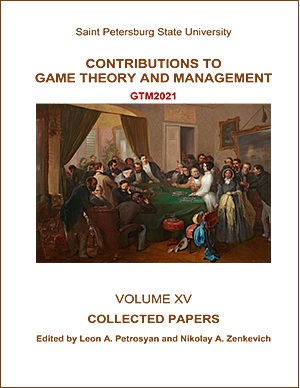Optimal Control in a Multiagent Opinion Dynamic System
DOI:
https://doi.org/10.21638/11701/spbu31.2022.05Abstract
Keywords:
multiagent system, opinion dynamics, linear-quadratic games, Euler-equation approach
Downloads
Download data is not yet available.
References
Bauso, D. Tembine, H. and Basar, T. (2016). Opinion Dynamics in Social Networks through Mean-Field Games. SIAM J. Con. Opt., 54(6), 3225–3257
Dechert, D. (1978). Optimal control problems from second-order difference equations. J. Econ. Theory, 19(1), 50–63
Deffuant, G., Neau, D., Amblard, F. and Weisbuch, G. (2000). Mixing beliefs among interacting agents. Advances in Complex Systems, 3(01n04), 87–98
DeGroot, M. H. (1974). Reaching a consensus. J. Ame. Sta. Ass., 69(345), 118–121
Elliott, R., Li, X. and Ni, Y. H. (2013). Discrete time mean-field stochastic linear-quadratic optimal control problems. Automatica, 49(11), 3222–3233
Friedkin, N. E. and Johnsen, E. C. (1990). Social influence and opinions. J. Mat. Soc., 15(3–4), 193–206
Gao, J. and Parilina, E. (2021a). Average-oriented opinion dynamics with the last moment of observation. Control Processes and Stability, 8(1), 505–509 (in Russian)
Gao, J. and Parilina, E. M. (2021b). Opinion Control Problem with Average-Oriented Opinion Dynamics and Limited Observation Moments. Contributions to Game Theory and Management, 14, 103–112
Gonzlez-Snchez, D. and Hernndez-Lerma, O. (2013). Discrete-time stochastic control and dynamic potential games: the Euler-Equation approach. Chap. 2. Springer International Publishing: Cham, Switzerland
Gonzlez-Snchez, D. and Hernndez-Lerma, O. (2014). On the Euler equation approach to discrete-time nonstationary optimal control problems. J. Dyn. Games, 1(1), 57
Hegselmann, R. and Krause, U. (2002). Opinion dynamics and bounded confidence models, analysis, and simulation. J. art. soc. soc. simu., 5(3)
Ignaciuk, P. and Bartoszewicz, A. (2010). Linear-quadratic optimal control strategy for periodic-review inventory systems. Automatica, 46(12), 1982–1993
Liu, X., Li, Y. and Zhang, W. (2014). Stochastic linear quadratic optimal control with constraint for discrete-time systems. App. Math.Comp., 228, 264–270
Mazalov, V. and Parilina, E. (2020). The Euler-Equation Approach in Average-Oriented Opinion Dynamics. Mathematics, 8(3), 355
Ni, Y. H. Elliott, R. and Li, X. (2015). Discrete-time mean-field Stochastic linear-quadratic optimal control problems, II: Infinite horizon case. Automatica, 57, 65–77
Rogov, M. A. and Sedakov, A. A. (2020). Coordinated Influence on the Opinions of Social Network Members. Automation and Remote Control, 81(3), 528–547
Sedakov, A. A. and Zhen, M. (2019). Opinion dynamics game in a social network with two influence nodes. Vestnik of Saint Petersburg University. Applied Mathematics.Computer Science. Control Processes, 15(1), 118–125
Sznajd-Weron, K. and Sznajd, J. (2000). Opinion evolution in closed community. Int. J. Mod. Phy. C, 11(06), 1157–1165
Downloads
Published
2023-01-25
How to Cite
Gao, J., & Parilina, E. (2023). Optimal Control in a Multiagent Opinion Dynamic System. Contributions to Game Theory and Management, 15, 51–59. https://doi.org/10.21638/11701/spbu31.2022.05
Issue
Section
Articles
License
Articles of "Contributions to Game Theory and Management" are open access distributed under the terms of the License Agreement with Saint Petersburg State University, which permits to the authors unrestricted distribution and self-archiving free of charge.




